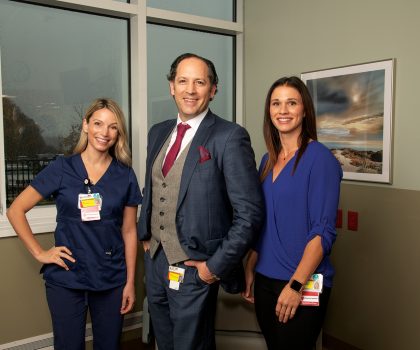At University Hospitals Geauga Medical Center, CT-scan lung cancer screening is helping doctors detect cancer in its early, more treatable and curable stages

By Ken McEntee
Lung cancer is the leading cause of cancer death in men and women, and kills more people than any medical condition except for heart and cardiovascular disease, says Luis Argote-Greene, MD, FCCP, a thoracic and esophageal surgeon at University Hospitals Geauga Medical Center.
Yet, Dr. Argote-Greene says, until recently, unlike breast, colon and prostate cancers, there was no common test to detect lung cancer at early, and more treatable stages.
Today there is. And it can be done right at UH Geauga Medical Center.
CT-scan lung cancer screening, Dr. Argote-Greene says, has been shown to reduce the lung cancer death rate by 20 percent in a US based study, and as much as 61 percent in women and 26 percent in men in a European trial.
Medicare—and many private insurance providers—will cover the cost of the CT lung cancer screening for patients.
The United States Preventive Service Task Force (USPSTF) recommends annual screening for lung cancer with low-dose computed tomography (LDCT) in:
- Men or women between the ages of 55 to 80
- Smoked on average at least one pack of cigarettes per day for 30 years, or two packs per day for 15 years
- Quit smoking less than 15 years ago
- Must not be showing any current symptoms of lung cancer
Other people may ask their physician about a CT lung cancer screening, but probably will have to pay for it themselves, Dr. Argote-Greene says.
The purpose of the screening is to detect lung cancer in Stage 1 or Stage 2, when the likelihood of successful treatment is substantially higher than for Stage 3 or Stage 4.
“When lung cancer is detected in early stages, the cure rate is better than 90 percent,” Dr. Argote-Greene says. “Treatment may be as simple as a small surgery and one night in the hospital. You may not even need to have chemotherapy or radiation treatments.”
The mandate for coverage of CT lung screening emerged after a 2014 study of 54,000 patients revealed that the test reduced the risk of dying from lung cancer by 20 percent in middle aged and elderly smokers. Further research in Europe revealed a 61 percent death rate reduction for women and 26 percent for men, Dr. Argote-Greene explains.
A CT lung screening will detect suspicious spots—or “nodules”—in the lungs.
“Between 60 to 90 percent of patients have nodules in their lungs, but most of the time they are not cancerous,” Dr. Argote-Greene says. “However, if one is suspicious, it can be tested.”
Dr. Argote-Greene emphasizes that the CT screening is a detection tool and doesn’t prevent cancer.
“The best way to prevent lung cancer is to not smoke,” he says.
That not only means smoking cigarettes, but also the use of electronic cigarettes, also called vaping.
“Vaping is a time bomb,” Dr. Argote-Greene cautions. “We haven’t yet established whether there is or isn’t a connection between vaping and cancer, but we do know that there are a lot of unknown chemicals in the vapor. The vapors contain oils that put fats and other chemicals in your lungs that shouldn’t be there.”
If you are diagnosed with lung cancer, the Seidman Cancer Center at UH Geauga Medical Center is able to provide a variety of treatments conveniently close to home.
“We can coordinate treatments and other visits on the same day to make it easier and less stressful for our patients,” says Jacquelyn McCloskey, physician assistant at UH Geauga Medical Center. “When a patient is nervous about a diagnosis, we don’t want him or her to have to wait for weeks to see an oncologist.”
You can get more information about CT lung cancer screening by visiting UHHospitals.org/Geauga, or schedule a test by calling 440-901-1278. University Hospitals Geauga Medical Center is located at 13207 Ravenna Road, in Chardon.
